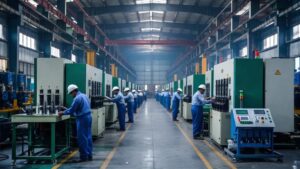Introduction
The global landscape of trade policies is in a constant state of flux, influenced by geopolitical shifts, economic strategies, and technological advancements. These changes have significant implications for various industries, including the transformer and switchgear sectors, which are critical to modern infrastructure and energy systems. For companies reliant on these technologies, navigating these complexities requires a strategic approach to supply chain management, product sourcing, and cost control. As a minority, female-owned company with a strong focus on resilient supply chains, Blueflux Power is at the forefront of addressing these challenges by leveraging friend shoring and cutting-edge technologies.
Tariffs and Duties
One of the most direct impacts of trade policies on the transformer and switchgear industry is the imposition of tariffs and duties. These financial levies are often placed on imported components and finished products to protect domestic industries, but they can also lead to increased costs for consumers. For instance, tariffs on steel, aluminum, and other raw materials used in the manufacturing of transformers and switchgear can significantly raise production costs. Similarly, duties on imported finished products can make these items more expensive in the US market, driving up prices for end-users.
The result is a challenging environment for companies that rely heavily on global supply chains. To mitigate these impacts, Blueflux Power has adopted a friend-shoring strategy, sourcing components from countries like India rather than from higher-tariff regions such as China. This approach not only helps control costs but also aligns with Blueflux Power’s commitment to ethical sourcing and quality assurance.
Trade Agreements
Trade agreements like the North American Free Trade Agreement (NAFTA) and its successor, the United States-Mexico-Canada Agreement (USMCA), play a pivotal role in shaping the global market for transformers and switchgear. These agreements are designed to facilitate trade by reducing or eliminating tariffs, standardizing regulations, and promoting economic cooperation among member countries. For the transformer and switchgear industry, these agreements have both positive and negative impacts.
On the positive side, such agreements can reduce costs and improve market access by removing trade barriers. For example, under USMCA, tariffs on many electrical components and finished products were reduced, benefiting manufacturers and consumers alike. However, the renegotiation of these agreements can also introduce uncertainty and disruption, as seen with the transition from NAFTA to USMCA. Companies must adapt to new rules and regulations, which can involve significant compliance costs.
For Blueflux Power, these agreements underscore the importance of building a flexible and resilient supply chain. By focusing on domestic distribution and sourcing from trusted international partners, the company can better navigate the complexities of evolving trade agreements while maintaining competitive pricing and high-quality standards
.
The Search for Alternatives
In response to the challenges posed by trade policies, many companies in the transformer and switchgear industry are seeking alternatives to traditional supply chains. This includes exploring new sourcing regions, investing in domestic manufacturing, and developing innovative technologies to reduce dependence on imported components.
Blueflux Power has been proactive in this regard, emphasizing friend-shoring over offshoring to China. By sourcing components from India and other strategic partners, the company can maintain product quality while mitigating the risks associated with tariffs and supply chain disruptions. Additionally, Blueflux Power’s investment in cutting-edge technology, such as advanced control engineering and cyber protection, further differentiates its products in a competitive market.
The Role of Government Support
Government policies and initiatives play a crucial role in supporting domestic manufacturing and reducing reliance on imports. Incentives such as tax breaks, grants, and subsidies can encourage companies to invest in local production facilities, creating jobs and strengthening the domestic economy. Additionally, government support for research and development can foster innovation in industries like transformers and switchgear, leading to more efficient and cost-effective solutions.
Blueflux Power recognizes the importance of government support in achieving its goals of resilient supply chains and high-quality product offerings. By aligning its operations with national priorities, such as energy independence and technological leadership, the company is well-positioned to benefit from government initiatives aimed at bolstering domestic manufacturing.
Conclusion
The transformer and switchgear industry is deeply intertwined with global trade policies, which can have far-reaching effects on pricing, supply chains, and market dynamics. Companies like Blueflux Power are leading the way in adapting to these challenges through strategic sourcing, investment in technology, and a commitment to quality. As trade policies continue to evolve, Blueflux Power’s approach to building resilient supply chains and leveraging friend-shoring will be critical in delivering reliable and cost-effective solutions to meet the demands of the modern energy landscape.




